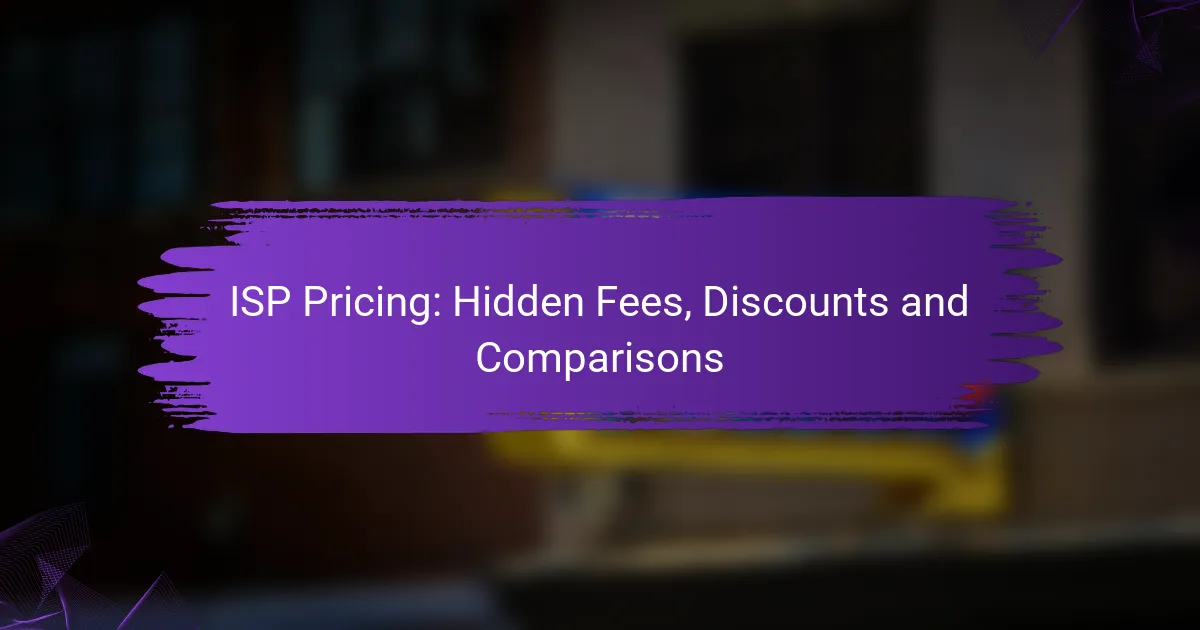Understanding ISP pricing is crucial for consumers looking to avoid unexpected costs and maximize savings. Hidden fees can inflate your monthly bill beyond the advertised rate, while various discounts and promotional offers can help reduce expenses. By comparing different providers and their offerings, you can make informed decisions that best suit your internet needs.
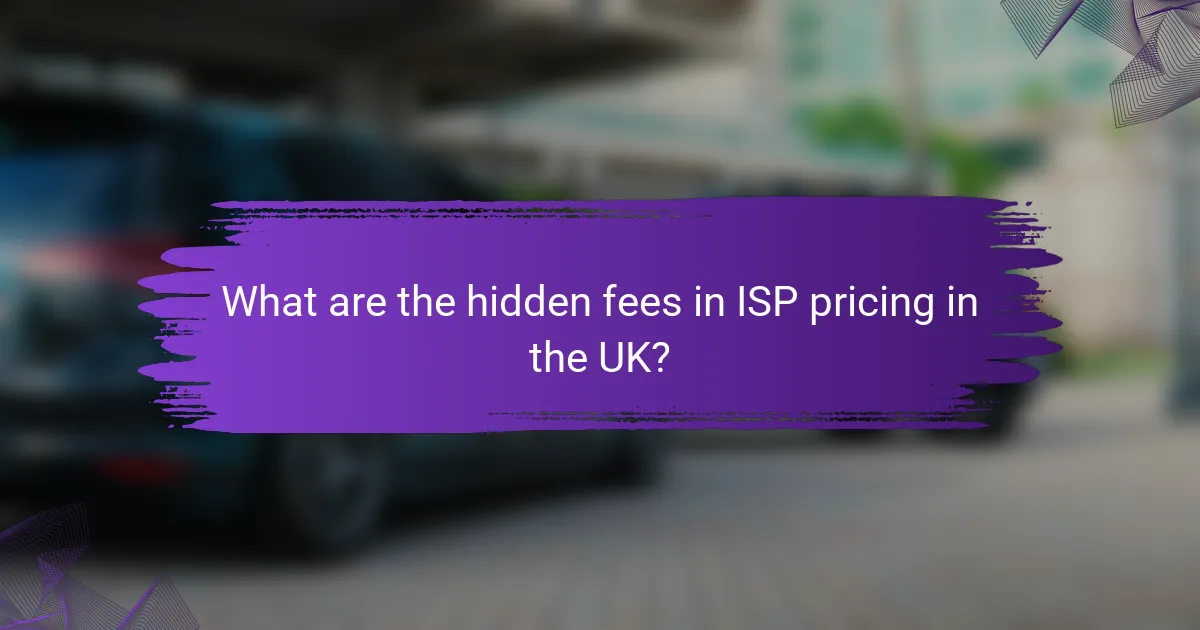
What are the hidden fees in ISP pricing in the UK?
Hidden fees in ISP pricing in the UK can significantly increase your monthly bill beyond the advertised rate. Common charges include installation fees, equipment rental, and penalties for early contract termination, which can catch consumers off guard.
Installation charges
Installation charges are fees that ISPs may impose for setting up your internet service at home. These can range from £50 to £200, depending on the complexity of the installation and whether a technician visit is required. Always check if the installation is included in promotional offers.
Some providers may waive installation fees for new customers as part of a promotional deal, so it’s worth asking about any current offers before signing up.
Equipment rental fees
Many ISPs charge a monthly fee for renting equipment, such as routers or modems. This fee typically ranges from £5 to £10 per month. If you prefer to avoid this recurring cost, consider purchasing your own compatible equipment upfront.
Be sure to check the terms regarding equipment rental, as some providers may require you to return rented devices upon cancellation to avoid additional charges.
Early termination fees
Early termination fees (ETFs) are charged if you cancel your service before the end of your contract. These fees can vary widely, often ranging from £50 to £300, depending on how much time is left on your contract. Understanding the length of your commitment is crucial before signing up.
To avoid ETFs, look for flexible plans that allow month-to-month service or those with shorter contract terms.
Data overage charges
Data overage charges apply when you exceed your monthly data allowance. These fees can be steep, sometimes costing £5 to £10 for each additional 1GB used. Many ISPs offer unlimited data plans, which can be a better option for heavy users.
Always monitor your data usage, especially if you are on a capped plan, to avoid unexpected charges at the end of the billing cycle.
Service activation fees
Service activation fees are one-time charges that ISPs may apply to initiate your service. These fees typically range from £20 to £50 and are often included in the first bill. Some promotions may waive this fee, so inquire about any available discounts.
When comparing ISPs, consider both the activation fee and the monthly rate to get a clearer picture of your total costs.
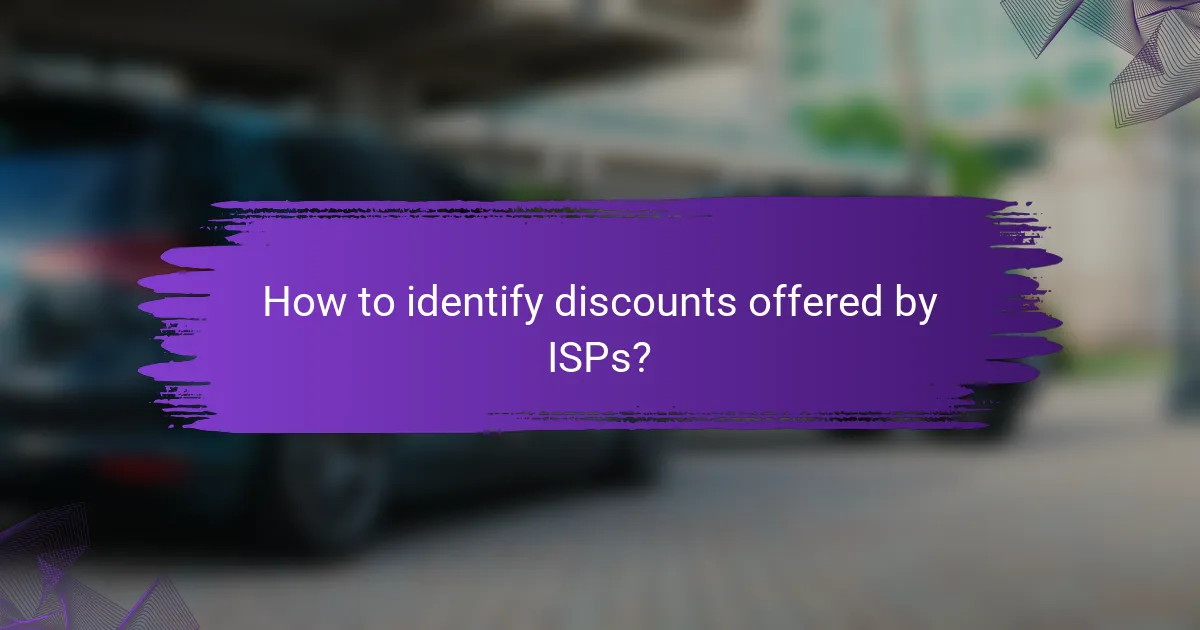
How to identify discounts offered by ISPs?
Identifying discounts from Internet Service Providers (ISPs) involves researching various promotional offers, loyalty programs, bundled services, and referral bonuses. By understanding these options, you can potentially reduce your monthly bill and maximize your savings.
Promotional offers
Promotional offers are temporary discounts that ISPs provide to attract new customers. These can include reduced rates for the first few months or free installation services. Always check the terms, as these offers often revert to standard pricing after the promotional period ends.
For example, an ISP might offer a plan at $30 per month for the first six months, which then increases to $60. Be sure to calculate the total cost over the contract duration to assess the true value of the deal.
Loyalty discounts
Loyalty discounts reward long-term customers with reduced rates or special perks. ISPs may offer these discounts after a certain period, typically ranging from one to two years of service. Contact your provider to inquire about any available loyalty programs.
For instance, a customer who has been with an ISP for two years might receive a 10% discount on their monthly bill. This can lead to significant savings over time, especially for high-speed plans.
Bundled service discounts
Bundled service discounts are available when you purchase multiple services from the same provider, such as internet, television, and phone. ISPs often provide a lower combined rate than if you purchased each service separately.
For example, a bundle might cost $100 per month for internet and cable, compared to $70 for internet alone and $50 for cable separately. Always compare the total costs to ensure you are getting a better deal with the bundle.
Referral bonuses
Referral bonuses reward existing customers for bringing in new subscribers. If you refer a friend or family member, both you and the new customer may receive a discount or credit on your bills. This can be a great way to lower your costs while helping others find a good service.
Typically, referral bonuses can range from $50 to $100, depending on the ISP. Check the referral program details to understand how to qualify and claim your rewards effectively.
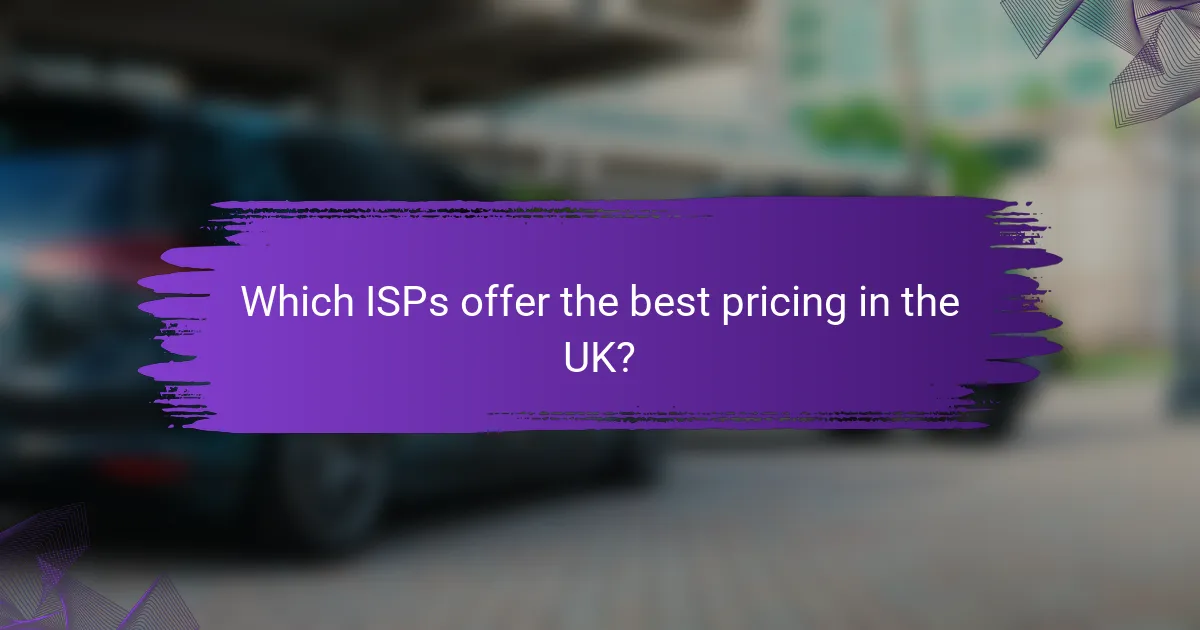
Which ISPs offer the best pricing in the UK?
The best pricing for ISPs in the UK often varies based on promotional offers, contract lengths, and included services. Key players like BT, Sky, Virgin Media, and TalkTalk frequently compete on price, but hidden fees and discounts can significantly affect the overall cost.
BT Broadband pricing
BT offers a range of broadband packages that cater to different needs, with prices typically starting from around £25 per month for standard broadband. Customers should be aware of potential setup fees and the cost of equipment, which can add to the initial expense.
Promotions often include discounted rates for the first few months, but it’s crucial to check the terms for any price hikes after the promotional period ends. Additionally, BT’s pricing may vary based on the speed and data allowances chosen.
Sky Internet pricing
Sky’s broadband pricing generally starts at approximately £26 per month, with options for both standard and fibre broadband. Like BT, Sky frequently runs promotional offers that can lower the initial monthly fee, but these may come with a minimum contract period.
Customers should consider the total cost of ownership, including any installation charges and equipment fees. Sky also offers bundle deals that include TV services, which can provide additional savings if you need multiple services.
Virgin Media pricing
Virgin Media is known for its high-speed broadband options, with prices starting around £28 per month for basic packages. Their pricing structure can be more complex due to various speed tiers and bundle options, which may include TV and phone services.
Hidden fees can include installation costs and charges for equipment rental, so it’s essential to read the fine print. Virgin Media often has competitive introductory offers, but customers should be cautious of price increases after the initial period.
TalkTalk pricing
TalkTalk offers some of the most competitive pricing in the UK, with packages starting as low as £24 per month. Their straightforward pricing model is appealing, but customers should watch for additional fees related to installation and equipment.
TalkTalk frequently provides discounts for new customers, but these offers may have limited durations. It’s advisable to compare the total costs, including any potential increases after the promotional period, to ensure the best deal is secured.
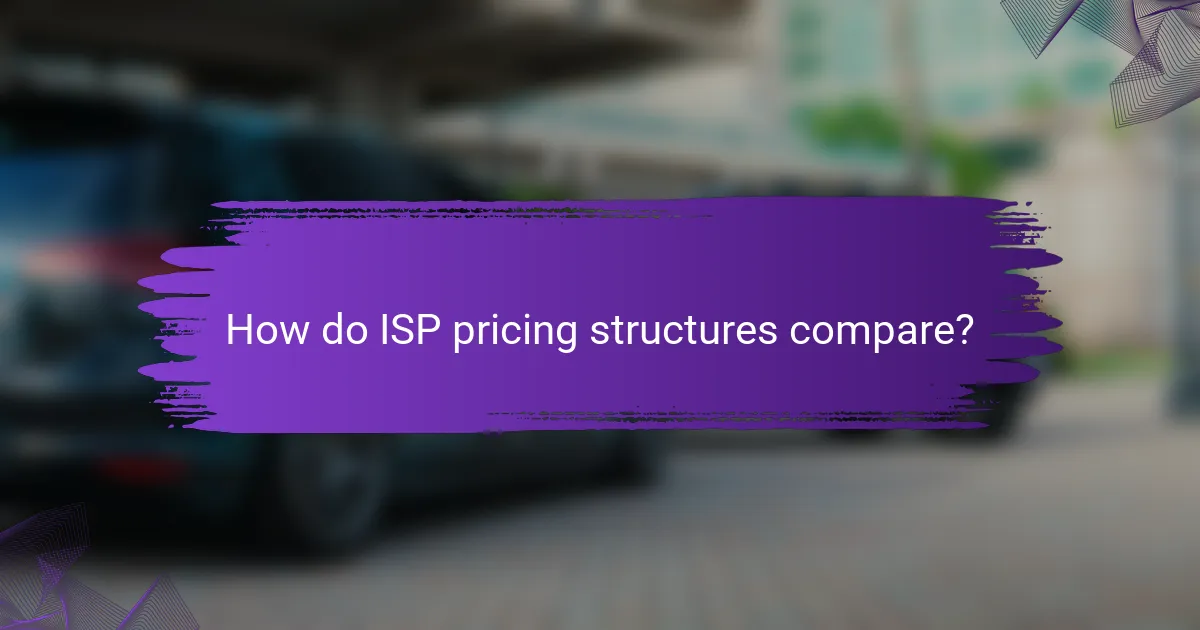
How do ISP pricing structures compare?
ISP pricing structures vary significantly across providers, influenced by factors such as monthly fees, contract lengths, and service speeds. Understanding these differences can help consumers make informed choices and avoid unexpected costs.
Monthly subscription costs
Monthly subscription costs for internet services can range widely, typically from around $30 to over $100 depending on the plan and provider. Basic plans often offer lower speeds at reduced prices, while premium plans with higher speeds and additional features come at a premium. Always check for promotional rates that may only apply for the first few months.
It’s crucial to consider not just the base price but also any additional fees that might apply, such as installation charges or equipment rental fees. These can add up and significantly affect the total monthly cost.
Contract lengths
Contract lengths for internet service can vary from month-to-month agreements to multi-year commitments. Shorter contracts provide flexibility but may come with higher monthly rates, while longer contracts often offer lower prices but can lock you in for a significant period.
When evaluating contract lengths, consider your future needs and whether you might want to switch providers or upgrade your service. Some ISPs may charge early termination fees if you decide to cancel before the contract ends.
Speed vs. price analysis
Speed versus price analysis is essential when choosing an ISP. Generally, higher speeds come with higher costs, but the value can vary based on usage. For example, a household that streams video and plays online games may require faster speeds, while casual users might find lower speeds sufficient.
When comparing plans, look for the Mbps (megabits per second) offered and calculate the cost per Mbps. This can help you identify the best value for your specific internet needs. Additionally, consider the reliability of the service, as a cheaper plan may not be worth it if it frequently experiences outages.
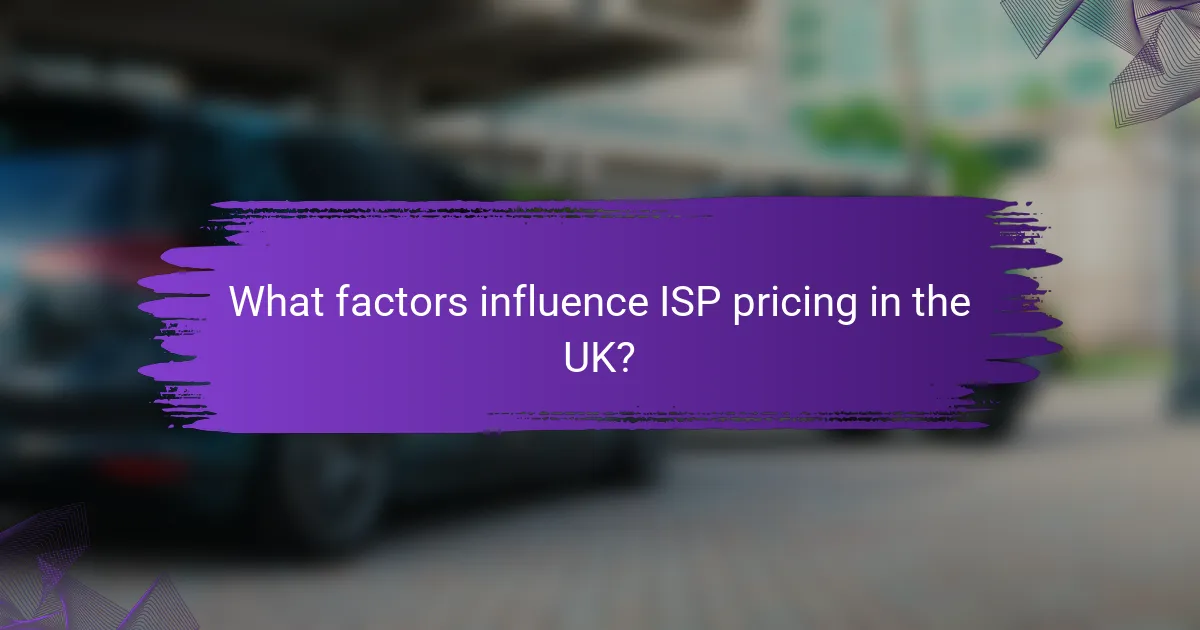
What factors influence ISP pricing in the UK?
ISP pricing in the UK is influenced by various factors including geographic location and the type of service offered, such as fiber or DSL. Understanding these elements can help consumers make informed choices and potentially save on costs.
Geographic location
Your geographic location significantly impacts ISP pricing in the UK. Urban areas typically have more competition among providers, which can lead to lower prices and better deals. In contrast, rural regions may have limited options, resulting in higher costs and fewer promotional offers.
When considering an ISP, check the availability of services in your area. Some providers may offer exclusive deals or packages based on location, so it’s wise to compare options specific to your postcode.
Service type (fiber vs. DSL)
The type of service you choose, whether fiber or DSL, greatly affects pricing. Fiber-optic connections generally offer faster speeds and more reliable performance, but they can come at a premium price. DSL, while often cheaper, may not provide the same level of speed and reliability, especially in areas with poor infrastructure.
When evaluating ISPs, consider your internet usage needs. If you stream videos or play online games frequently, investing in a fiber plan may be worthwhile despite the higher cost. Conversely, for basic browsing and email, a DSL option might suffice and save you money.
